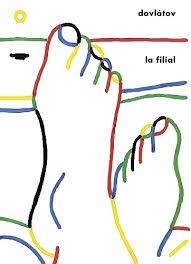
Original language: russian
Original title: Branch
Translation: Tania Mikhelson and Alfonso Martínez Galilea
Year of publication: 1990
Valuation: Alright
The valuation can be read It is equivalent, or that’s how I see it, to say if you read it, nothing bad will happen to you, your aesthetic sense and your spirit will not be offended, nor will your stomach be damaged. But don’t wait any longer either. From there to Alright There is a step. It’s the same thing but the book has something more, it is entertaining, it has a certain interest in some field, it is novel, fun, with especially pleasant prose. Some of these characteristics have pushed me to raise the rating for this book by Dovlátov, which although it looks semi-complete, even with hard covers, can be read in a jiffy. Agile, light, are to begin with some of those virtues that sometimes please, perhaps in the absence of other more valuable things. (Also, since I know that the Russian author has some prominent defenders on this blog, I have to be careful)
Dovlátov emigrated to the United States at the end of the 70s of the last century, after discovering that his ironic style and his tendency to go on his own did not exactly please the Soviet authorities. After stumbling through various Russian exile publications, he begins to make a name for himself in the Western world, and in this his latest novel focuses on a symposium of Slavic intellectuals held in Los Angeles in 1981. With a distant echo of a story similar to David Lodge, Dovlátov reviews a good number of Russian emigre authors, always with his caricature tone. The problem is that (despite the illustrative and very praiseworthy appendix offered, as is her trademark, by translator Tania Mikhelson) it is difficult for any reader outside of Russian literature and thought of the moment to know practically any of the names. that are masked behind the proposed sosias. So, in this aspect, satire is largely devalued.
Another thing is that we may be attracted to the author’s peculiar style, a very American style that seems to have caused rashes in the most irreducible defenders of traditional Russian prose, with its tragic and somewhat grandiose component. In Dovlátov, the short sentence and the paragraph rounded with humor completely dominate, the wit that, it must be admitted, sometimes makes us laugh even though we do not even identify the protagonist of it.
For the rest, and unless we are very interested in the author’s biography, I don’t find anything much more attractive either. Perhaps the only thing may be the peculiar relationship of the protagonist with an old girlfriend, a figure behind whom is apparently what was Dovlátov’s first partner (and I don’t know if he was his wife). The book presents it as a reunion on the occasion of the aforementioned congress of intellectuals, recounting the strange coincidence in parallel with the details of their old relationship, when they were still university students in the USSR. The relationship was already then full of encounters and disagreements, supposed infidelities, amorous outbursts and estrangements without a clear explanation, something with a toxic component that the author cannot fully explain and that, after many years, he is still unable to unravel. . The drawing is very successful, probably because, as sometimes happens, the situation itself gives rise to a good repertoire of nuances, from humor to desperation, indifference, passion and perhaps even hatred.
The whole book, with that strong autobiographical component that I personally don’t like too much, is somewhat reminiscent of his compatriot and contemporary Limonov, who is in fact cited a couple of times, although fortunately without his insufferable egomania. In reality, they are two characters who have quite a few similarities, although they differ in that Dovlátov seems to have naturally assumed a certain style of his adopted country and, although he continues to write in Russian, that old tendency towards lightness and sarcasm that aroused the rejection in his homeland have been very good for him to integrate into the North American literary scene.
Also by Sergei Dovlátov in ULAD: here
Source: https://unlibroaldia.blogspot.com/2024/04/serguei-dovlatov-la-filial.html


